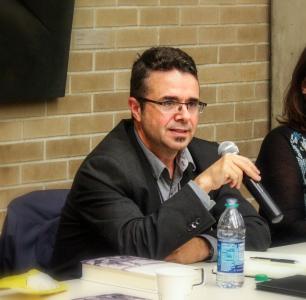Professor David Cook-Martín, Sociology, is celebrating the release of his second book “Culling the Masses: The Democratic Origins of Racist Immigration Policy in the Americas,” which is being published by Harvard University Press.
On Monday, Nov. 3 in Burling Lounge, Cook-Martín hosted a celebration and a reading of his new book with an introduction given by Professor Karla Erickson, Sociology. Notably, the release of “Culling the Masses” comes only a year after the publishing of Cook-Martín’s first book, “The Scramble For Citizens: Dual Nationality and State Competition for Immigrants.”
Cook-Martín said that he thoroughly enjoyed the venue chosen for the celebration of his book, due to the nature of its academic space and conduciveness to research.
“I really like that space because it puts you in the center of intellectual migration because people are always going there and it’s where a lot of the work of ours happens,” Cook-Martín said.
Erickson kicked off the night by introducing Cook-Martín with lighthearted remarks and then lauding his ambition in taking on such a huge project.
“Most of us would be advised to stray away from such a huge project,” Erickson said to an attentive audience. “But Cook-Martín, as many of our colleagues and his students here would know, is someone who makes big claims and makes them right.”

Photo by Megan Pachner.
After Cook-Martín humbly accepted Erickson’s praise, he began to tell the story of the process behind “Culling the Masses.”
Cook-Martín co-wrote “Culling the Masses” with University of California, San Diego Associate Professor of Sociology David Scott FitzGerald. The book’s central thesis challenges the existing theories developed by other scholars, which widely proclaimed that democracies have worked racism out of their laws. After analyzing legal documents from 22 countries in a time period spanning from 1790 to 2010, Cook-Martín and FitzGerald came to the conclusion that governments in the Americas have deliberately chosen immigrant populations based on ethnicity.
“While everyone was at conferences, we would be sitting in the New York non-circulation desk doing research for the project,” Cook-Martín admitted.
Cook-Martín stated that it was a long and tedious process but ultimately rewarding in many ways. Throughout his segment of the presentation, Cook-Martín told the audience that the process of writing his second book and with a co-author helped him grow as a writer and understand that writing was really his craft.
“We divided the responsibilities up by paces. Both of us would write the beginning of a chapter separately, and then we swapped to edit and revise each other’s works, and then swap again. By doing this, we were thinking more about the big picture rather than about the minute details that go into writing, which would come into play later,” Cook-Martín said.
Throughout the process, Cook-Martín asked for the advice of his students in different ways. In his classes, Cook-Martín asked students to find strengths and weaknesses in arguments throughout the book, and which parts should be cut and why.
“FitzGerald works with two different populations—undergraduate and graduate-level students,” Cook-Martín said. “Grinnell students may not have the experience graduate students may have, but they’re very good writers, they’re inquisitive, and they are willing to add things to answer different questions.”
After reading an excerpt from the book, Cook-Martín handed the spotlight to Professor Rebecca Hamlin, Political Science.
Hamlin’s research is very similar to Cook-Martín’s in the sense that she focuses on migration through a political science lens while Cook-Martín focuses on those topics through a sociological lens. Hamlin, like Erickson, began her comments by praising “Culling the Masses.”
“I have to echo what Professor Erickson said earlier tonight in that Cook-Martín’s research was not easy but he sheds light on a lot of issues that weren’t being discussed in scholarly dialogues,” she said,
After a brief analysis of the excerpt Cook-Martín read, Hamlin kicked off the question-and-answer segment of the night, followed by other professors.
And to give the audience a final hint of his productivity, Cook-Martín provided the attendees a glimpse of his next research, which is built off of “Culling the Masses.”
“I already have a huge chunk of the early stage of the project done because of all the research that I did with ‘Culling the Masses,’ but now I want to add European and Middle Eastern cases to the project,” he said.



















































